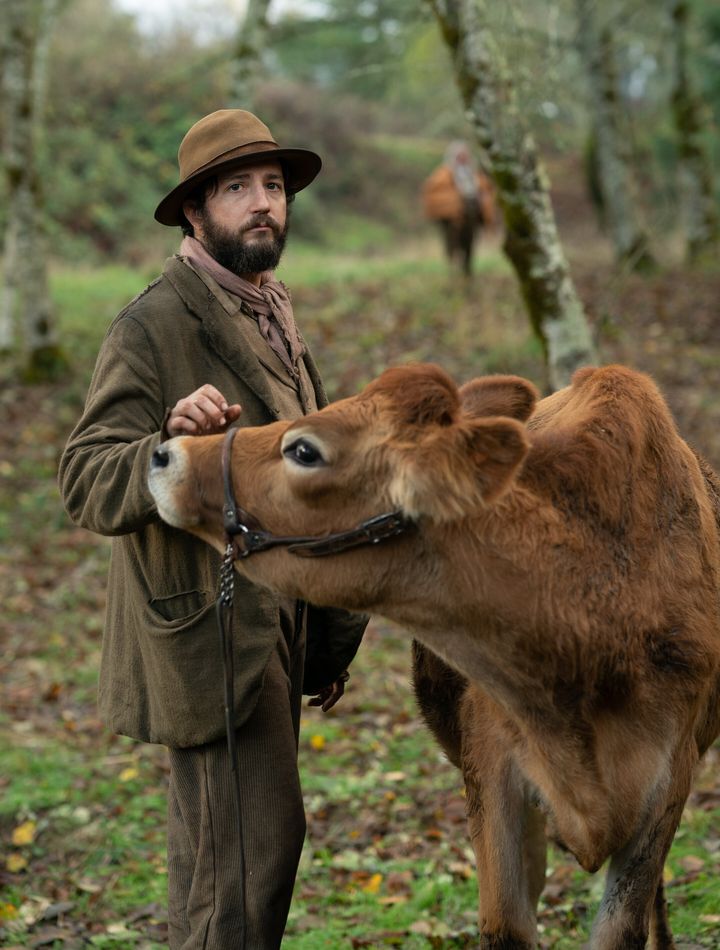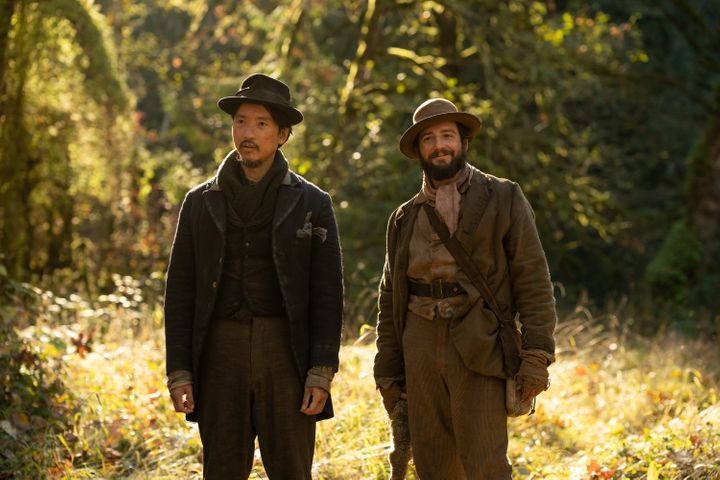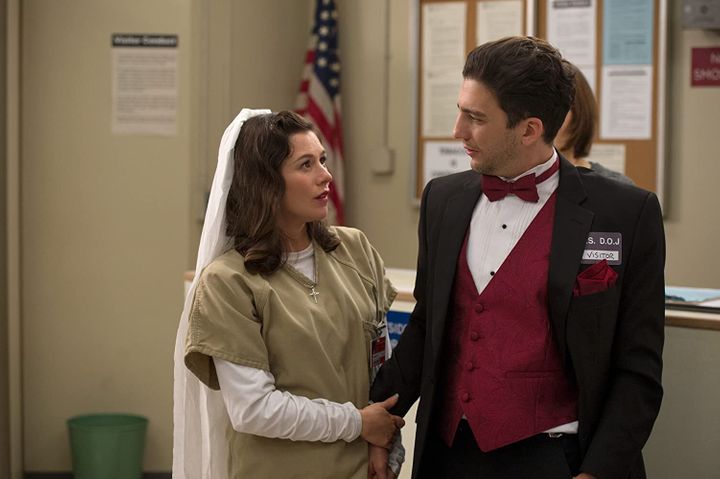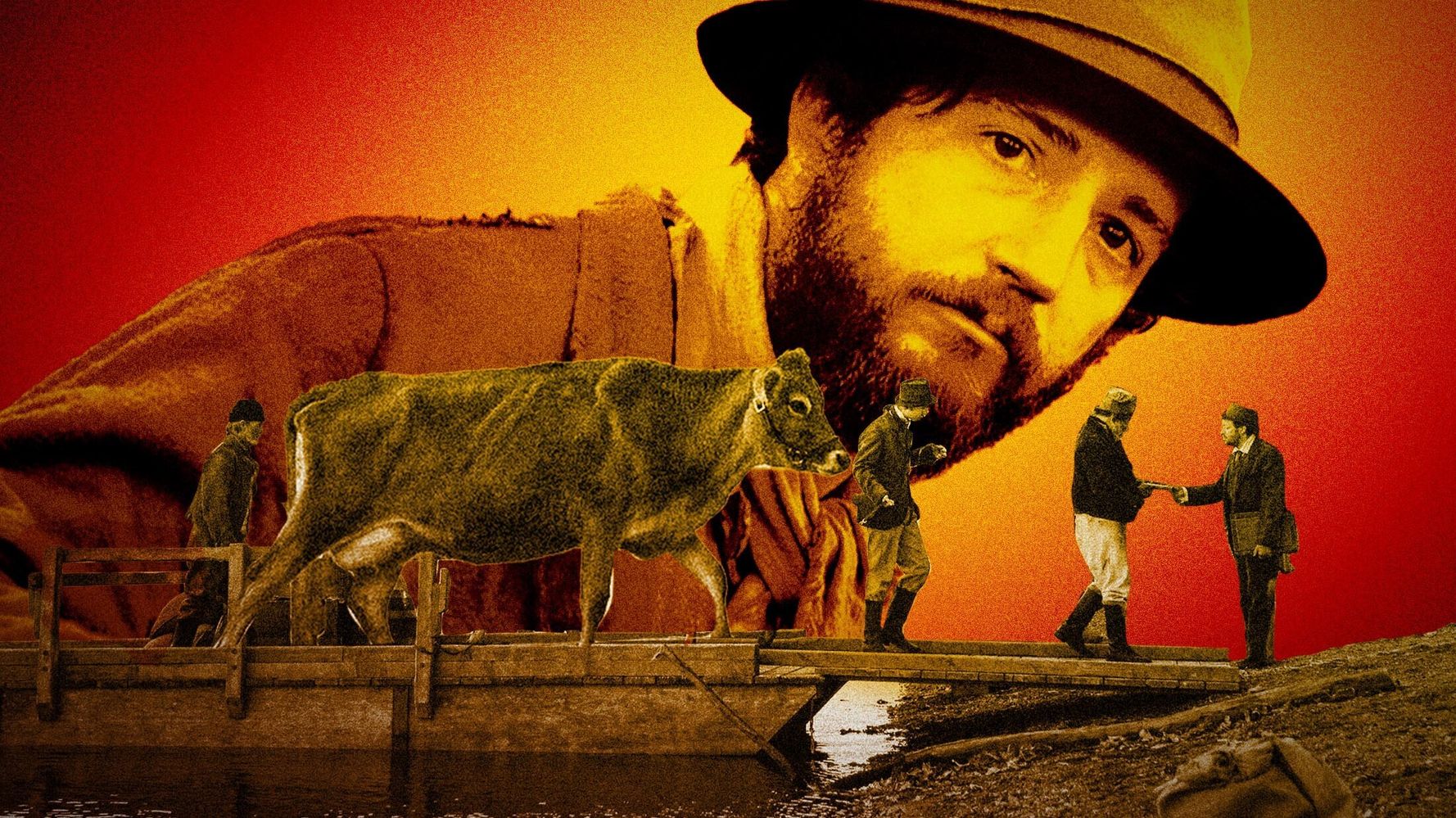[ad_1]
John Magaro has had many illustrious co-stars over the years: James Gandolfini, Rooney Mara, Ryan Gosling, Chadwick Boseman, Eve the cow. It’s that last one we need to talk about. Never heard of her? You’re in for a teat. I mean a treat.
Eve — friends call her Evie — portrays the title character in “First Cow,” the new movie from director Kelly Reichardt, who is revered for her quiet stories set in rural America. Magaro plays Otis “Cookie” Figowitz, a good-hearted cook in the 1820s Oregon frontier, where he works among a boorish group of fur trappers. Upon meeting King-Lu (Orion Lee), a Chinese immigrant hiding out in the woods, the two men strike up an affectionate friendship and form a lucrative enterprise making primitive donuts known as oily cakes. They couldn’t do it without Eve, who, unbeknownst to her wealthy British owner (Toby Jones), supplies the necessary milk.
Based on a Jonathan Raymond novel, “First Cow” premieres on video-on-demand platforms Friday following a late-winter theatrical run cut short by the COVID-19 pandemic. It is an exceptional breakthrough for Magaro, though technically he’s been around for a while. He’s done the splashy-role-that-didn’t-go-anywhere thing twice, first in Wes Craven’s slasher flick “My Soul to Take” (2010) and again in David Chase’s bittersweet ’60s-rock flop “Not Fade Away” (2012). Since then, Magaro has loaded his resume with impressive supporting turns in “Unbroken,” “Carol,” “The Big Short,” “Marshall,” “Overlord” and “The Umbrella Academy.” He is perhaps most recognizable as Vince Muccio, the love interest of Lorna Morello (Yael Stone) on “Orange Is the New Black.” Next year, he’ll appear in “The Many Saints of Newark,” a big-screen prequel to “The Sopranos.”
Magaro, 37, possesses a gentleness that works wonders in “First Cow,” one of 2020’s finest movies. As Cookie, his eyes are sad and his voice tired — the marks of someone who isn’t comfortable with himself or his hostile surroundings. When Cookie and King-Lu partner, the film becomes a lovely buddy drama with a soft, unspoken queerness characterizing the central relationship. The duo plays house in a cabin, adopting domestic duties and sharing their dreams for the future.
Back in March, when the movie was about to open in limited release, Magaro called me to discuss “First Cow” and his rising career.
Do you feel the positive energy around this film? After premiering at the Berlin and New York film festivals, it was clear how much people loved it.
It certainly feels like there is some. There’s always been a good energy surrounding the film, even from the start. I remember there was a moment on set in the cabin when I looked out, and there’s a First Nations man who’s doing tai chi [in a scene]. I remember after that going up to Kelly and being, like, “Wow.” I don’t know how I phrased it, but it was, like, “This feels like something magical.”
What was your experience milking cows before this movie?
What kind of training did you go through to be ready for that?
About five minutes of training. You grab the udder, and you pull. Pretty instinctive. And it’s pretty simple. It’s just when the cow was there on the first night, the handlers kind of took me over to her and showed me what to do. But it’s pretty simple. Once you get the hang of it, it’s like [riding] a bike.

Everybody seems to adore Evie, and she’s become a star of her own online. She recently had a baby!
Yeah, maybe teenagers will start putting posters of her on their wall. A pinup. She’ll be like the new Cheryl Tiegs.
This is a role that lends itself to interiority. The expressions on your face and the look in your eyes say as much as, if not more than, the words that come out of Cookie’s mouth. Was that clear to you immediately?
In the script, there was a lot of information there as far as how Cookie is in his behavior. He is a gentle soul. He’s very kind; he’s very quiet. He’s out of place. That kind of stuff washes over you as you feel the characters sort of get into your bones, so you just let the story take you on that journey. Whether there’s a million words in the script, or there’s five words in the script, I think any good actor is constantly doing that.
Unfortunately, a lot of films don’t trust the silence, and they cut away from those moments where, oftentimes, that’s where the actors are almost doing their best work. I’m a big believer that we as human beings live in the silence and live in the things that aren’t said. Those are the most revealing moments, I think, that we witness from other people. So I’m glad that Kelly allows that to happen.
Another thing I love about this movie is that there’s a certain queer undertone to the men’s relationship. Maybe that’s simply because we don’t often see two men supporting each other so tenderly. But I have to assume you guys had some sort of discussion about this, or that it at least crossed your mind at some point, even though it’s not explicit in the story.
There might’ve been a very bare and brief, like, two-sentence discussion about that, and I think everyone had their own take on the level of intimacy in this relationship. I won’t go into how deeply I feel about it, but I certainly feel that this film, whether it’s a queer story or a queer-adjacent story, lives in the world of queer cinema. There is a deep love between these two men. Whatever level that gets, I don’t think it’s super relevant. They are in a relationship, and they are in love, and I think there’s no denying that. They need each other. They are partners in business and in life in this movie, and they can call roles in the household. You know, Cookie is nesting while King-Lu is out hunting and gathering. So you get to see this version of a relationship that may have existed in the early 1800s in a no-man’s-land frontier.
Right, the ambiguity is actually more compelling here. And I don’t even mean the question of, “Well, when the camera isn’t rolling, so to speak, are they hooking up?” The impact rests in the unspoken grayness that is so specific to its time period.
And also the question is, where would it have gone if they had more time together? We only get to see fleeting moments of their relationship, and then the shadows of their relationships. There’s so many more colors that Kelly allows us to paint in our mind.

You’ve spent the last few years working on a lot of action projects with hefty amounts of money behind them: “The Finest Hours,” “War Machine,” “Unbroken,” “Overlord,” “Jack Ryan,” the list goes on. How different was the experience of making “First Cow,” which by design doesn’t look or feel anything like those others?
I think films all have a general feeling that is similar, whether it’s a huge budget or a small budget, especially once you’re in front of the camera, and you’re doing the scenes. That being said, “First Cow” still had some money behind it. I don’t know what the end-of-the-day budget was, but it was a few million dollars. I’ve worked on films where it’s under $1 million, and then you start to really feel indie cinema. So this still had resources behind it. It still had [trendy indie studio] A24 behind it. It had Scott Rudin producing, who is a legend in the business. So we already had some legs behind it, which was very fortunate and helps even get it to the place that it is now.
It’s taken Kelly Reichardt years to even get to this point. Still so many people don’t know who she is, and they should. But that’s the struggle of filmmaking. You know, any film getting made is a miracle. And if you can make it for less and get it somewhere, then that’s even more exciting. Oftentimes you’ll work on a big-budget movie, and there’s such high expectations, and it makes it even harder to cut through the crowd.
When “Not Fade Away” was coming out, it was seen as an exciting prestige project. It was this ’60s rock story, and it was David Chase’s first project after “The Sopranos” ended. Then it came and went without making any kind of splash in the world, at least commercially. I’m curious what that experience was like for you. Did you feel stoked up for something that was supposed to be a huge breakthrough?
I’d had a little experience with that before. My first experience with that was a studio movie, which I had my first lead in, which was this horror movie called “My Soul to Take.” That thing became a disaster. By nature, I’m just sort of a cautious, almost pessimistic realist, so I live in a place — this is terrible to say — of lower expectations. Obviously I hoped that “Not Fade Away” was going to do better than it did.
But I also was aware that it wasn’t a traditional rock-and-roll story. The ending was much more ’60s or ’70s European cinema than traditional American rock and roll, in any case. So I knew we were up against that. I also was aware that there really wasn’t anyone famous in it besides James Gandolfini. None of the young guys [like Jack Huston and Dominic Sherwood] were big names.
It’s hard, especially coming out in award season, to go up against a lot of big projects. Yeah, it’s disappointing. But where I grew up, there’s a mentality of you have to pick yourself up and keep moving. Fortunately for me, even though it’s hard sometimes — and I do get depressed, and I deal with that — I have been able to keep moving. Without being able to do that in this business, you’re going to have a much harder time.
Along the way, you made “Carol,” which is one of the most beloved movies of the past decade. At what point, if at all, did you realize that “Carol” had such a devoted cult following?
Probably not until a few years after. When you start seeing BuzzFeed articles or even HuffPo articles where they’re [listing] the top films of the last decade, and “Carol” starts popping up on lists, then you start to realize, “Oh, wow, this really has connected.” With “Carol,” I felt a similar thing that I do about “First Cow.” Maybe it’s because [“Carol” director] Todd Haynes and Kelly are such close friends, and they have a deep history together and appreciate a lot of the same kind of cinema.
You know, Todd has an audience, but, again, not everyone is seeing his movies. But “Carol” has found legs after its success that year. That’s something that time only tells. Even when you said “Not Fade Away” — since I’ve been doing this press tour for “First Cow,” people have been bringing up “Not Fade Away” — so when you start to hear things mentioned years after, that helps. That makes you realize, “Oh, this is something that has started to accumulate a loyal following.”

When you were first cast on “Orange Is the New Black,” what were you told about where that character was headed and how long you would be around? The role ended up spanning most of the series, and Vince and Lorna’s relationship had a lot of unexpected texture.
Not much. I got a call about that audition maybe a day before I went in. I knew it was going to be a recurring part, but I didn’t know how many episodes. On those kinds of shows, they don’t tell you anything. They just say whether it’s a one-episode thing or recurring, basically how much you need to be around. Then after the first episode, it stretched into a couple more that season. And then by the end of the first season, we were married, so I assumed I might be around in the next season.
But I also know how these TV shows work, and in the time off they could have killed me, or we could have been broken up. So it just sort of unfolded. As the years went by, you get a call, and they’d say, “Hey, they want you to come in for this.” And it was always great to go back. I had such a great time with Yael Stone, who played Lorna in that. We had a lot of fun together. It was always a little mini-reunion.
Did “The Many Saints of Newark” fall into your lap because of the David Chase connection?
David and I have become very close over the years. I almost think of him as a mentor. He’s very paternal to me in a way. I still had to audition for it because David was producing and Alan Taylor was directing. I don’t think it ever hurts to know people. Just like in any job, if you have a reference, you’re probably going to have a better chance of getting hired. But I still had to audition to get my place there.
It’s interesting to see you step into the “Sopranos” world because you worked with James Gandolfini after the series ended. To the best of your awareness, how did the absence of Gandolfini feel while making the movie?
Well, the absence of Jim is something we all remember. Everyone who knew him, he was just such a big presence in so many ways. And I learned so much from working with him. That scene we do in “Not Fade Away” toward the end, where we’re in the restaurant, and he starts to finally speak honestly to me as a son, was just a master class, getting to sit across from him. We actually had worked on two films by that point together [including 2011’s “Down the Shore”], so it was nice.
But the good thing about “The Many Saints of Newark” is that it is a prequel [set] in the ’60s and ’70s, so James wouldn’t have been there. But as you know, we do have his son, Michael Gandolfini, who is playing the young version of James. Not only is the resemblance so close, but their mannerisms are very similar. Watching Michael rise to the challenge and deliver such a beautiful performance was impressive, especially with the weight that he had on his shoulders stepping into his father’s shoes in such an iconic role. But I will say, I think he is going to shine extraordinarily bright in that role.
Calling all HuffPost superfans!
Sign up for membership to become a founding member and help shape HuffPost’s next chapter
[ad_2]
Source link

